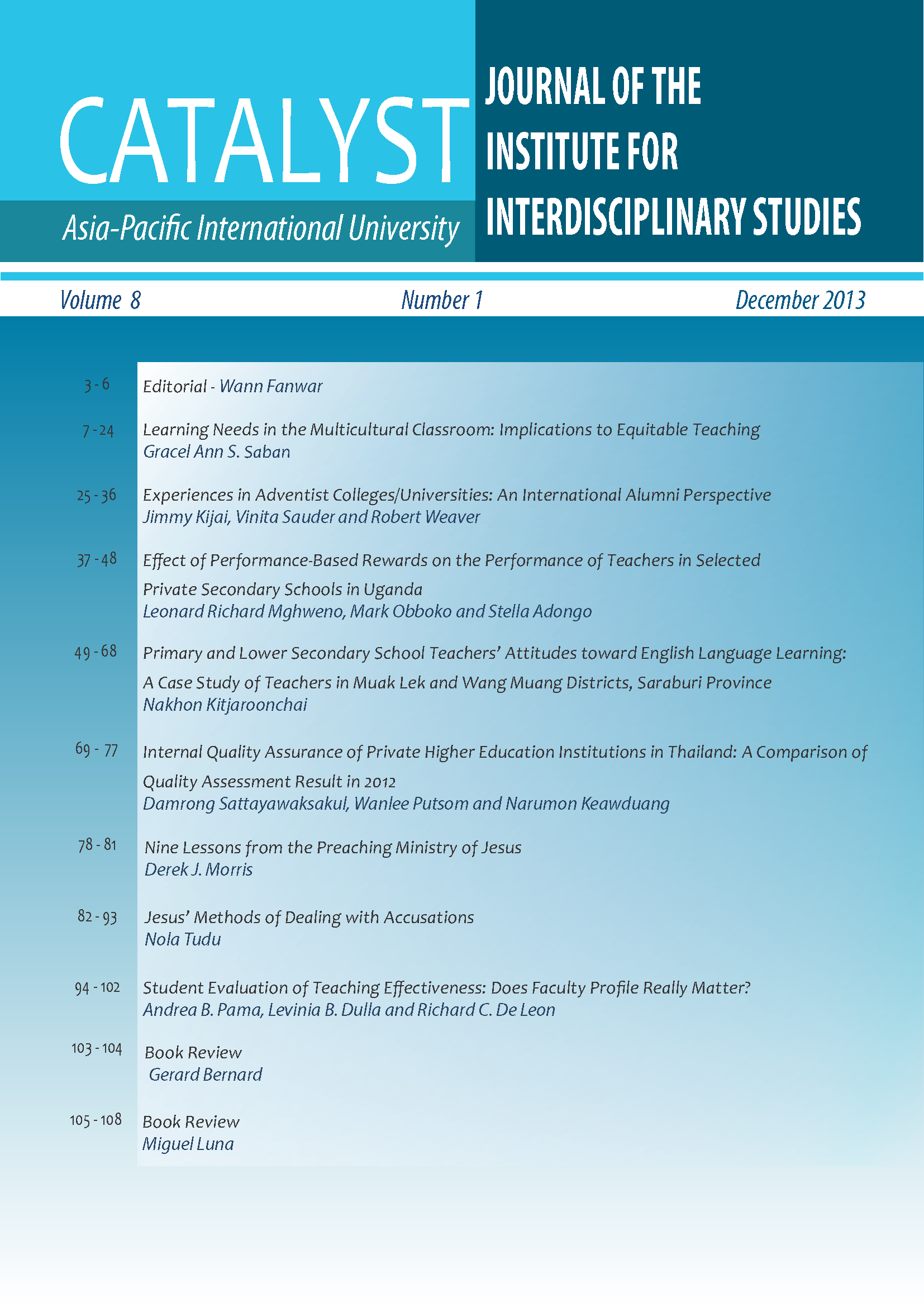Effect of Performance-Based Rewards on the Performance of Teachers in Selected Private Secondary Schools in Uganda
Main Article Content
Abstract
A cross-sectional and correlation research was conducted to investigate the effects of performance-based rewards on the performance of teachers in selected private secondary school in Gayaza Township in Uganda; using questionnaire and interview guide to 113 respondents. The study revealed the types of performance-based rewards common in private secondary schools to be public appreciation (mean, 3.67), packages (gifts or presents) (mean, 3.44), duty allowance (mean, 3.41), certificate of merit (mean, 3.21), and overtime pay (mean, 2.98). The study revealed also that there is a significant relationship between the performance-based rewards and performance of teachers which was moderately rated (mean, 3.22), with r-value = 0.743 and p-value = 0.012 at α = 0.05. It is concluded that, when used properly, performance-based rewards can improve teachers’ performance, consequently the general performance of students.
Article Details

This work is licensed under a Creative Commons Attribution-NonCommercial-NoDerivatives 4.0 International License.
Copyright: Asia-Pacific International University reserve exclusive rights to publish, reproduce and distribute the manuscript and all contents therein.
References
Lecture Series 64. Benin City: University of Benin, Nigeria.
Ajao, W. (2001). Cadbury is Determined to Move Education Forward. Vanguard, December 27, 2001, p.16.
Azordegan, J., Byrnett, P., Campbell, K., Greenman, J., & Coulter, T. (2005). Diversifying Teacher Compensation (Issue Paper No. 1). Education Commission of the States (December 2005). Retrieved April 6, 2013 from, http://www.ecs.org/ecsmain.asp?page=/html/issues.asp
Boddy, D. (2008). Management: An introduction, fourth edition, New York: Prentice Hall.
Chamberlin, R., Wragg, T., Haynes, G. & Wragg, C. (2002). Research Papers in Education, 17(1), 31-49. ‘Performance-related pay and the teaching profession: a review of the literature.
Department for Education Schools (DES). (2013). School Teachers Review Body reports: 21st report (2012) and 22nd report (2013). Retrieved on November 6, 2013, from https://www.education.gov.uk/schools/ careers/payandpensions/a00203870/strb-remit-21st-report
Department of Education Science and Training (DEST). (2007). Performance-based rewards for teachers: Surveys and Workforce Analysis Section, Skills Analysis and Quality Systems Branch, Australia.
Flynn, G. (1998). Is your recognition program understood? Workforce, 77(7), 30-35.
Harvey-Beavis, O. (2003). Performance-Based Rewards for Teachers: A Literature Review, Workshop of Participating Countries on OECD’s Activity Attracting, Developing and Retaining Effective Teachers 4-5 June 2003, Athens, Greece.
Israel, G.D. (2009). Determining sample size. Program evaluation and organizational development, IFAS,University of Florida.
James, B.S. and Gail, M. (2001). Performance-Based Pay for Teachers, paper for CRS Report for Congress.
Jimenez, R. (1999). Managing Employee Retention Through Recognition. T+D, 53 (10). 53-55.
Keller, J. (1999). Motivational Systems. In H.D. Stolovitch & E.J. Keeps, (Eds.), Handbook of Human Performance Technology. (373-394). San Francisco: Jossey-Bass Pfeiffer.
Kirunda, H.K. (2004). Performance-based rewards and the performance of teachers in private secondary schools in Kampala district. MA Dissertation, Makerere University.
Lavy, V. (2007). Using Performance-Based Pay to Improve the Quality of Teachers. The Future of Children 17(1), 87-109. Retrieved on August 19, 2013, from https://muse.jhu.edu/journals/future_of_children/ v017/17.1lavy.html
Lawler, E.E. (2003). Treat people right. San Francisco: Jossey-Bass Inc.
Murnane, R.J., & Cohen, D.K. (1986). Merit pay and the evaluation problem: Why most merit pay plans fail and a few survive. Harvard Educational Review, 56(1), 1-17.
Nelson, B. (2004). Everything you thought you knew about recognition is wrong. Workplace Management. Retrieved on February 16, 2012, from http://www.workforce.com.
Odden, A. and Kelley, C. (2002). Paying Teachers For What They Know And Do: New And Smarter, OECD, Retrieved on May 23, 2013, from http://www.oecd.org/dataoecd/17/47/34077553.pd
Richardson, R. (1999) Performance Related Pay in Schools: An Assessment of the Green Papers, A report prepared for the National Union of Teachers, The London School of Economics and Political Science.
Ryan, S. (n.d.). “Rewards and Recognition.” http://edweb.sdsu.edu/people/arossett/pie/Interventions/ incentivesrewards_2.htm
Solmon, L.C. and Podgursky, M. (no date). The Prons and cons of Performance-based Compensation. Acessed on 6 November 2013, from http://web.missouri.edu/podgurskym/articles/files/Pros_cons.pdf.
Stedman, J. B. and Mc Callion. G. (2011). Performance-Based Pay for Teachers, paper for CRS Report for Congress
Uchefuna, M.C. (2001). A Study of Clinical Supervision and Teachers Effectiveness in Umuahia and Abia Educational Zones of Abia State. M.Ed Dissertation, Unpublished, Port Harcourt: University of Port.
Wikipedia, The Free Encyclopedia. (2013). Gayaza. Retrieved on November 6, 2013, from http://en.wikipedia. org/wiki/Gayaza.


